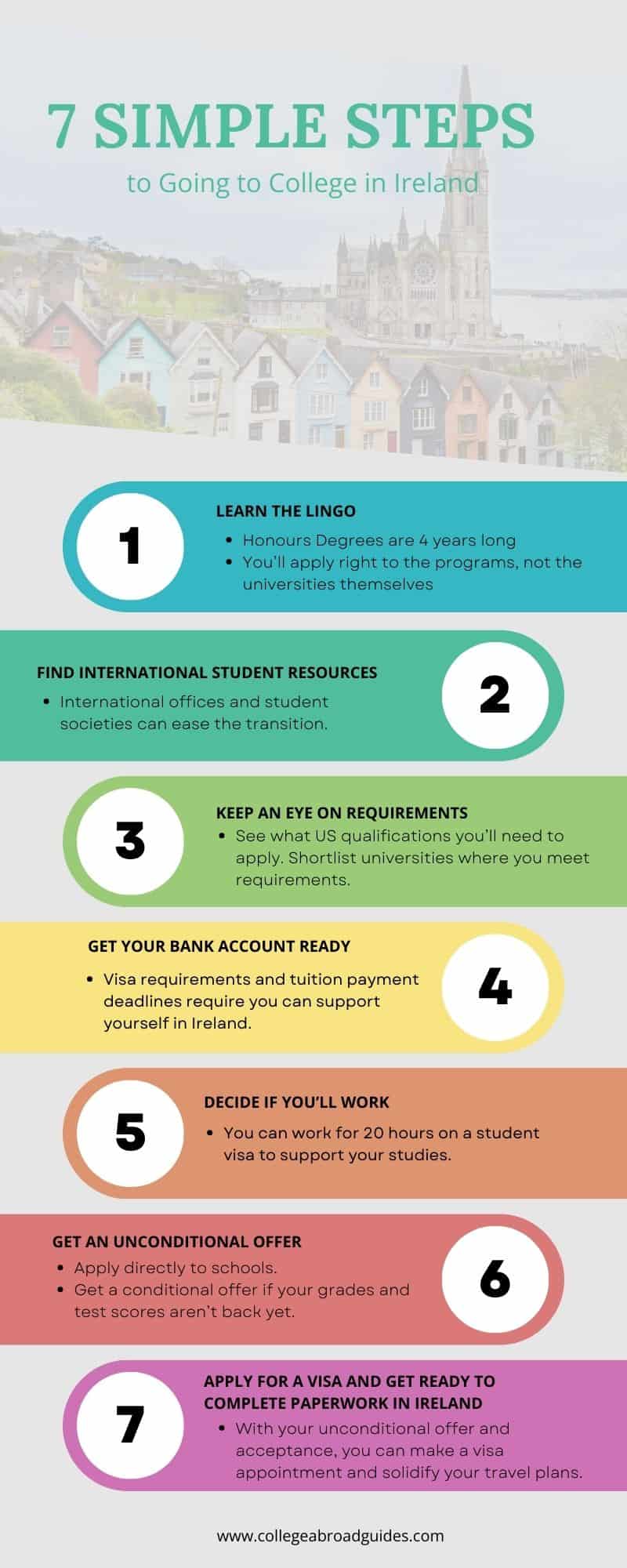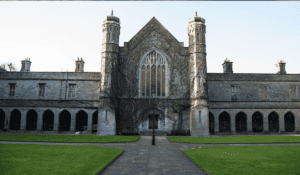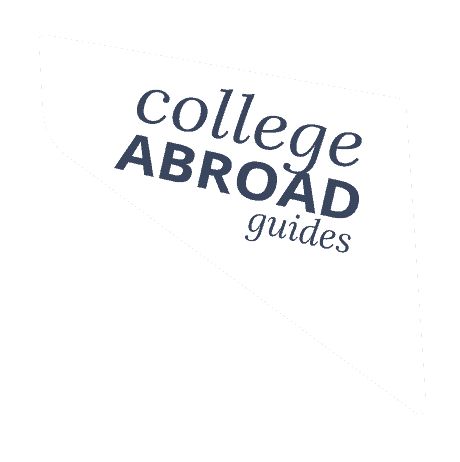
The Simple Beginner’s Guide to How to Go to College in Ireland

- Originally published
- Last updated on October 24th, 2023 at 11:10 am
Table of Contents
The 101 Guide for International Students on College in Ireland
It’s no blarney: we talked to tons of students who go to college in Ireland, including every one of the Emerald Isle’s 8 public universities and its private medical university. We asked them everything from why Ireland is great for international students, how they applied, and what pitfalls they encountered.
They gave us a bunch of good tips that we included in this guide. If you don’t know where to start, start here where we’re answering your biggest questions about what college in Ireland is like, all in one place, with student outcomes and tips.
Here’s what the journey looks like:

Why Ireland?
Ireland has study programs in English and deep cultural ties with America. It has gorgeous green countryside, neolithic sites, and romantic, windswept coastlines. Perhaps because of the place it already occupies in the American imagination, Ireland is already Americans’ #7 most popular study abroad destination.
In fact, there are currently 1,000 American students studying for an undergrad degree full-time in Ireland, plus more than 18,000 international students studying in Ireland for a semester or an academic year. Those students can benefit from internships and work opportunities without facing a language barrier.
Why did I come here? Dublin is very walkable and not very big. It's easy to explore on foot and is located close to the beaches and the hills. There are a lot of international people here, which means that you will find comfort places to eat and people similar to you. I especially love that it's very artsy and literary (which is why I chose to come here). Trinity's central location means that you're not too far from anything, from parks and malls to restaurants and commute options. After Brexit, a lot of companies such as Meta, Amazon, Accenture, and PwC have moved their EMEA headquarters here too.
There’s more good news: Ireland has been ranked as one of the top ten safest countries on earth. It’s a small country where violent crime is highly confined to drug crime in Dublin, not to student and campus life. As a result, Ireland’s quality of life is high. It’s ranked #2 in the world by the UN in 2020 (losing to Norway) for its high educational attainment, fab healthcare, and high life expectancy.
These factors make Ireland attractive to international students.
Can I go to college in Ireland?
Yes, international students are welcome to apply and attend university in Ireland. You won’t need any country-specific tests or credentials.
Many international students happily attend Irish universities.
While college tuition fees are much higher for out-of-EU international students, they are also reasonable compared to American tuition, with many students graduating for the price of a single year at their first-choice American college. And don’t forget scholarships.
Comparing Costs:
If you attend one of the US’s most popular schools for out-of-state students (the University of Vermont) you’ll pay $43,890 per year. Add $5,870 per year for a room shared with three other students, and you’ll spend $199,040 over 4 years. At the University of Limerick, annual international tuition is $15,360.
In total, expect to pay less than half in Limerick: $81,248.
In state? You’ll still pay $18,240 more in Vermont.
Is Ireland good for international students?
Yes, Ireland is considered safe, welcoming, and inclusive for its international students.
Some campuses are internationally oriented. Trinity College Dublin, for example, is made up of 28-32% international students. It’s the 17th most international university in the world, according to Times Higher Education Rankings.
Schools like Trinity College Dublin may be exceptionally friendly for international students. For instance, TCD has an international student liaison office and a global student room that hosts events and helps international students with logistical and cultural concerns.
Ireland is known to have nice people and that was definitely my experience. Walking into pubs, everyone was always open for a chat and interested in why my friends and I chose to study in their country. I can happily say that I didn't have a bad interaction with anyone!
Other schools have gobs of Irish student organizations for students to join that help them find their people, including many schools with international student societies and international offices for logistic concerns.
For example, Maynooth also offers an international student office for its 700 incoming international students each year. It can coordinate registration and help students navigate health insurance, housing options, or counselling.
Can international students work in Ireland?
Yes, and Ireland makes it easy. Full-time students with a student visa at Irish universities do not even need a work permit to do casual work in Ireland that supports their studies. Full-time students will need to be registered with GNIB and can work 20 hours a week during the academic year and 40 hours per week over the summer.
Here's something to remember: If you do not like your program, but want to stay in Ireland, transferring means redoing the entire visa process. That interrupts your employment.
Post-graduation prospects on the Emerald Isle are strong, too. There is a post-grad visa that may let you stay in Ireland for 2 years while looking for a job. It’s the Irish Third Level Graduate Scheme visa. It’s available for graduates of any of Ireland’s 8 research universities and also Institutes of Technology like Dublin Institute of Technology and Royal College of Surgeons Ireland.
For U.S. students, there is also a one-year “working holiday” visa. Students can apply within one year of graduating.
All these options make integration into Irish society easier.
How many universities can you apply to in Ireland?
The Central Application Office (Ireland’s equivalent of the Common App application portal) isn’t available to U.S. applicants, who will directly apply to colleges through individual schools.
This makes the CAO limit of 10 programs per applicant moot. So go crazy applying to as many universities as you like. However, universities do limit the number of programs students can apply for – usually between 4 and 10 programs.
Some colleges in Ireland also take applications via the American application portal Common App. They are: University College Dublin, University of Limerick, and a private, Catholic education and liberal arts university called Mary Immaculate College in Limerick. If more than one of these universities is on your short list, the Common App can be most convenient since you’ll upload documents a single time.
How many universities are in Ireland?
There are eight research universities in Ireland:
Colleges in Ireland
- University of Limerick (Guide/Review)
- University College Cork (Guide/Review)
- Technological University Dublin (Guide/Review)
- Royal College of Surgeons in Ireland (Guide)
- University College Dublin (Guide/Review)
- University of Galway (Guide/Review)
- Maynooth University (Guide/Review)
- Dublin City University (Guide/Review)
- Trinity College Dublin (Guide/Review)
There are 8 public universities in Ireland and all the colleges in Ireland welcome international applicants. Clinical medicine students can also check out Royal College of Surgeons in Ireland for a direct-to-med path open to incoming first-year students.
Combined with institutes of technology, business schools, and the Royal College of Surgeons in Ireland, there are 23 programs offering bachelor’s degrees in Ireland.
How much is college in Ireland?
College in Ireland ranges from about €10000-€20000 annually. While there are “ordinary bachelor’s degree” programs that take three years to complete, most courses are four-year honor’s courses.
This results from a National Framework of Qualifications (NFQ) rating system where you’ll find state-supported universities offering NFQ levels 7-10 degrees.
Look at the different costs between all of Ireland’s universities including cost of living, rent, and tuition to see the least expensive colleges in Ireland. In general, you’ll pay more in accommodation and living costs if you attend a university in Dublin, Ireland’s most expensive city where the cost of living is 20% higher than in Limerick and housing can be 50% more expensive.
Is university free in Ireland?
Higher education in Ireland is not free for non-EU residents.
So how much is college in Ireland? International tuition costs are typically around €20,000 per year. Tuition totals range from a total of €54,000 for a degree from Technological University Dublin to €348,810 to complete a multi-year medical degree at Royal College of Surgeons in Ireland as an international student.
International students must pay tuition, but are also subject to fees for student services. Fees max out at €3000 annually and can change yearly.
When does university start in Ireland?
Irish universities run on semesters. The typical academic year is from the beginning of September through the beginning of June, with a reading and exam week capping off each semester.
There’s usually an orientation week for “freshers” in August. Students who have not secured housing yet can arrive early to sort their phone plans, make calls, see residences, and make rental agreements in August.
Typically, the semester ends with an exam week just before the week of Christmas. This can make flight scheduling more expensive than American-style semesters. The spring semester can begin earlier, too. For example, in 2023-2024 at the University of Cork, students were free for winter break from December 22 to January 14 (no Martin Luther King Jr. holiday).
How to apply to colleges in Ireland
If you’re a non-EU student, you won’t be able to access the national application portal and must apply directly to your program using the instructions each university gives online.
This means uploading letters of recommendation, transcripts, etc., multiple times for each program. You’ll also need to keep track of the deadlines and stay on top of notifications in multiple places.
If you’re still in “choosing” mode, check out our guidebooks for detailed descriptions of English-taught programs in Ireland, geared toward American students, with interviews from students that go beyond facts and figures, giving you details that can help you find the place that’s perfect for you.
Ireland University Guides
Other Articles on Ireland
Related Posts

Jessica Share
Jessica is the writer, Ph.D., and mom-of-an-abroad-student-in-the-UK at the helm of College Abroad Guides. When she's not asking college students where the coolest place to hang out in their city is, she's figuring out how she can make $60 imported Greek oregano potato chips and £50 British bacon potato chips appear on her doorstep for the cost of a local bag of Lay's.






















